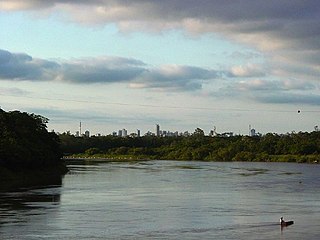Related Research Articles
The Spanish–Portuguese treaty of 1750 or Treaty of Madrid was a document signed in the Spanish capital by Ferdinand VI of Spain and John V of Portugal on 13 January 1750, to end armed conflict over a border dispute between the Spanish and Portuguese empires in South America in the vicinity of the Uruguay River, an area known as the Banda Oriental. The treaty established borders between the Spanish and Portuguese empires, ceding much of what is today's country of Brazil to the Portuguese.
Río Negro means "Black River" in both Spanish and Portuguese. It may refer to:

Rio Verde de Mato Grosso is a municipality located in the Brazilian state of Mato Grosso do Sul. Its population was 20,057 (2005) and its area is 8,152 km².
Esporte Clube Águia Negra, usually known simply as Águia Negra or as Águia Negra de Rio Brilhante is a Brazilian football club from Rio Brilhante, Mato Grosso do Sul state.

The Cuiabá River is a Brazilian river in the western state of Mato Grosso that flows in the Río de la Plata Basin. It is a tributary of the São Lourenço River.

The Taquari River is a river in the states of Mato Grosso and Mato Grosso do Sul in Brazil. It is a left tributary of the Paraguay River. The town of Coxim is situated on the Taquari.

Madeirinha River is a river of Mato Grosso and Amazonas states in north-western Brazil, a left tributary of the Roosevelt River.
The Aporé River is a river forming the border between Goiás and Mato Grosso do Sul states in central Brazil. It is a tributary of the Paranaíba River, which it enters in the reservoir created by Ilha Solteira Dam on the Paraná River.
The Camararé River is a river of Mato Grosso state in western Brazil. It is a tributary of the Juruena River.
The Jauru River is a river in Mato Grosso, a state in western Brazil. It is a tributary of the Paraguay River.
The Rio das Mortes is a river of Mato Grosso state in western Brazil. It has a length of 580 km.

The Ronuro River is a river of Mato Grosso state in western Brazil, a tributary of the Xingu River.
Rio Verde is a river of Mato Grosso state in western Brazil.

The Rio Negro is a river of Mato Grosso do Sul state in southwestern Brazil.
The Pardo River is a river of Mato Grosso do Sul state in southwestern Brazil. It is a tributary of the Paraná River, which it enters in the reservoir of Sérgio Motta Dam.
The Sucuriú River is a river of Mato Grosso do Sul state in southwestern Brazil. It is a tributary of the Paraná River, which it joins just upriver of Eng Souza Dias (Jupiá) Dam.
There are several rivers named São João River.

The Rio Flor do Prado Ecological Station (Portuguese: Estação Ecológica do Rio Flor do Prado is an ecological station in Brazil. It protects an area of Amazon rainforest and is administered the state of Mato Grosso.

The Culuene Biological Reserve is a biological reserve in the state of Mato Grosso, Brazil. It protects an area of cerrado forest in contact with seasonal deciduous forest on the left (west) bank of the Culuene River.
References
| This article related to a river in Mato Grosso, Brazil is a stub. You can help Wikipedia by expanding it. |